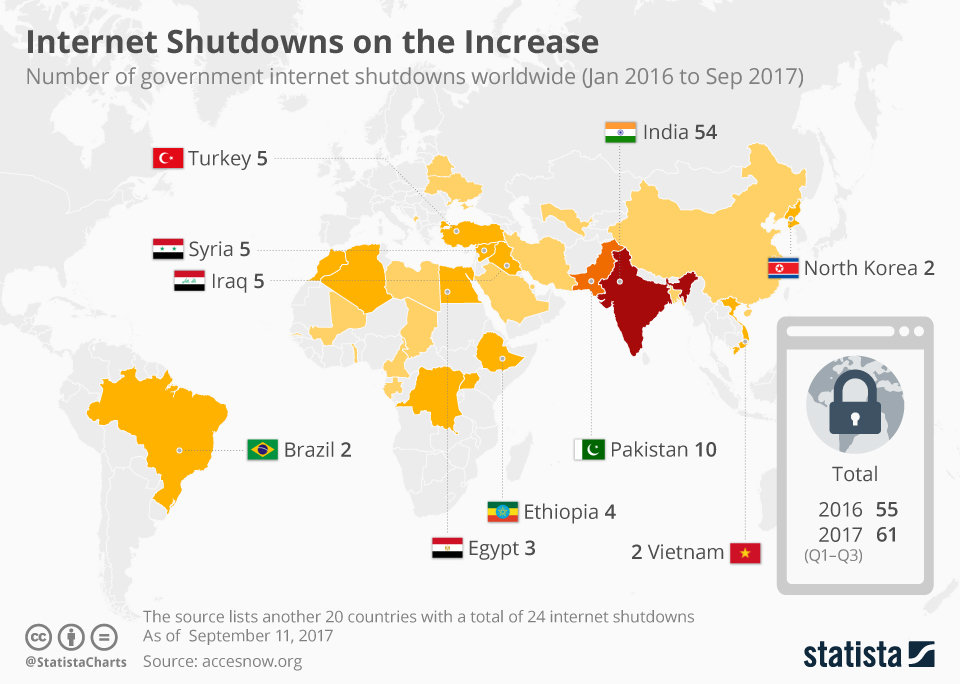116 Internet Shutdowns Show Why Physical Gold Is Ultimate Protection
– Internet shutdowns (116 in two years) show physical gold is ultimate protection
– Number of internet shutdowns increased in 2017 as 30 countries hit by shutdowns
– Democratic India experienced 54 internet shutdowns in last two years; Brazil 2
– EU country Estonia, a technologically advanced nation, experienced a shutdown
– Gallup poll shows Americans more worried about cybercrime than violent crime
– Governments use terrorist threat as reason for internet kill switch powers
– Own physical coins and bars rather than digital gold on a single platform
Editor: Mark O’Byrne
UNESCO is warning that the number of internet shutdowns is increasing worldwide. According to Statista.com when reporting data provided by digital rights platform accessnow.org, “internet access has been curbed 116 times in 30 countries since January 2016.”
“Internet shutdown: An intentional disruption of Internet or electronic communications, rendering them inaccessible or effectively unusable, for a specific population or within a location, often to exert control over the flow of information.” – Access Now.
One question that so many ask when first hearing about bitcoin is ‘what if the internet stops working?’ Bitcoin and crypto proponents scoff and point out that there is no singular ‘off button’ i.e. it would be near impossible.
According to ‘father of the internet’ Tim Berners-Lee, this is true:
“The way the internet is designed is very much as a decentralised system. At the moment, because countries connect to each other in lots of different ways, there is no one off switch, there is no central place where you can turn it off.”
Try telling that to the one billion plus people in India who have experienced over 54 internet shutdowns in the last two years.
Or those in Egypt who on January 27th 2011 could no longer get online as the government shut down the internet in response to the pre-Arab Spring protests.
Even in the EU, ten years ago technologically advanced Estonia appears to have been a victim of Kremlin-sponsored cyber warfare, when Estonians found they could no longer access their bank accounts. Individuals and companies could not use their computers for the simple daily tasks that we take for granted today – such as email.
The above three examples are not rare occurrences. In the last two years alone there have been 116 situations where governments or state sponsored hackers seem to have found the ‘off button’ for the internet across 30 countries. That’s not counting all of the incidences when there have been other cyber attacks that have ‘merely’ affected vital internal systems and disrupted key infrastructure for large sections of society.
So whilst countries might be more connected than ever, that isn’t much help to the citizens who find themselves very much disconnected whether on a mass or individual scale. Internet shutdown is definitely possible and it is happening:
“There are several ways to shut down the Internet. One way is to make sure that when you type in a web address, such as dw.com/mediadev, your Internet service provider doesn’t allow you to find the underlying IP address. Another way is when an Internet service provider messes with the routing tables and removes key details so that packets of information traveling on the web aren’t allowed to travel to their final destination. Governments are using increasingly sophisticated methods to disrupt communications”
This isn’t just a disaster for those using bitcoin, this is a disaster for anyone who relies on an internet connection be it for communication or accessing their finances. Many in the West look at internet controls as something that is exclusive to developing nations or those more on the totalitarian-regime end of the political spectrum.
Sadly this is not the case. As you will see government-sanctioned internet shutdown and cyberterrorism are ever-present across many nations. The result? Individuals must protect their own freedom and safety of their assets as the authorities may have other priorities.
Internet shutdown increases government powers
As the examples of India, Estonia and Egypt show internet shutdown is very much possible. It was the Egyptian shutdown of 2011 that prompted many other governments to realise the powers they could attain:
Until then, many governments had assumed it was not possible to turn off internet access to their entire nation, due to the decentralized nature of the network. But soon after, governments across the globe educated themselves about AS numbers and internet routing, and started using their power to set up systems that would allow them to order network shutdowns.
What was originally only intended to be used in more extreme circumstances has quickly devolved into officials using their powers for all sorts of questionable – and often political – reasons.
Internet shutdowns can be either at the will of the domestic government or a form of financial or military warfare from an outside authority or organisation.
India is where we see the highest number of authorised internet blackouts. Here government policy states that whilst such action requires the highest-level official in charge of domestic security – the Ministry of Home Affairs for the whole country or a state’s Home Department official – to sign off on any shutdown a junior member can shutdown the internet for a full 24-hours should gaining permission be unfeasible.
Click here to read full story on GoldCore.com.
Important Guides
For your perusal, below are our most popular guides in 2017:
Essential Guide To Storing Gold In Switzerland
Essential Guide To Storing Gold In Singapore
Essential Guide to Tax Free Gold Sovereigns (UK)
Please share our research with family, friends and colleagues who you think would benefit from being informed by it.


Leave a Reply